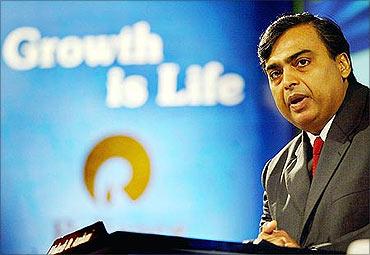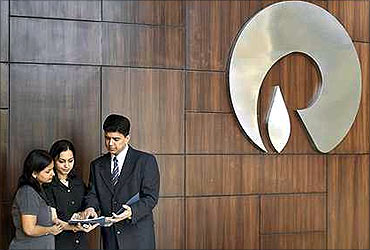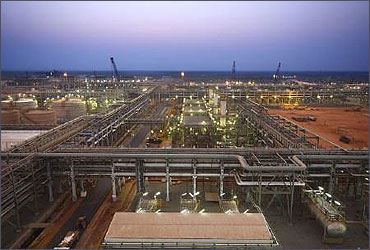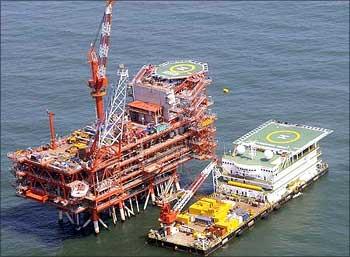Business Standard
When Reliance Industries Limited announced its buyback recently, the stock price soared even before the details were made public.
The buyback will "retire" a maximum of 120 million shares at a price of Rs 870, for a maximum cost of Rs 10,440 crore (Rs 104.4 billion). That's equivalent to 3.7 per cent of equity, at a premium of about 10 per cent over the last quoted price on Friday.
Many implications could be drawn from the buyback offer. The normal justification for a buyback is that a cash-rich business cannot see an obvious way to deploy its resources profitably.
A buyback boosts returns to shareholders who don't opt for the offer, by shrinking the equity base.
...
Is retiring shares best avenue for Reliance Industries?
Image: Shareholders own 44.71 per cent of the equity.Assuming the bigger shareholders don't sell, it also helps them consolidate holdings, which may have control implications. While the buyback is "live", there's a floor on the price.
RIL had a massive cash (and cash-equivalent) holding of Rs 74,500 crore (Rs 745 billion) on its balance sheet (on December 31, 2011). It also has about the same amount of debt. If it carries out the maximum buyback announced (it may not), it will end up with a negligible amount of net debt. The controlling shareholders own about 44.71 per cent of the current equity.
Assuming a maximum buyback, they would end up with 46.4 per cent of the reduced equity.
...
Is retiring shares best avenue for Reliance Industries?
Image: So this buyback makes no material difference to control.So this buyback makes no material difference to control, and the debt-equity ratio will continue to remain very low. However, is it true that RIL cannot find a better avenue to deploy cash resources?
The answer involves the consideration of the group's future plans. RIL's core refining and gas-production activities are facing new challenges. Refining is entering a cyclical phase of lower margins.
Gas production has fallen due to technical issues that will take until 2014-15 to sort out. So, boosting returns in the core business isn't easy. But it could, first of all, have used that cash to retire some debt, rather than retiring equity.
In addition, RIL has a huge number of diversification plans.
...
Is retiring shares best avenue for Reliance Industries?
Image: RIL has also made an entry into the media.The biggest is the broadband wireless access rollout via its subsidiary Reliance Infotel. According to presentations, it will invest around Rs 25,000 crore (Rs 250 billion) in a 600-city rollout offering 4G access.
RIL has also, of course, made an entry into the media; it has commitments in gas pipeline infrastructure; it has a presence in retail; and it has plans to exploit shale gas overseas. Taken together, those plans will absorb a considerable proportion of that Rs 74,500 crore (Rs 745 billion). Many of the diversifications are long-gestation and will be cash-flow negative for considerable periods.
...
Is retiring shares best avenue for Reliance Industries?
Image: Buyback doesn't seem very logical.Given all this, the buyback doesn't seem very logical. Is it the case that there are intentions of spinning off some businesses by listing key subsidiaries?
In that case, RIL's ability to raise large sums by the equity route, through either initial public offerings or private placements, would be influenced by its prevailing share price as well as sum-of-the-part valuations.
In that case, the buyback may make more sense.







article